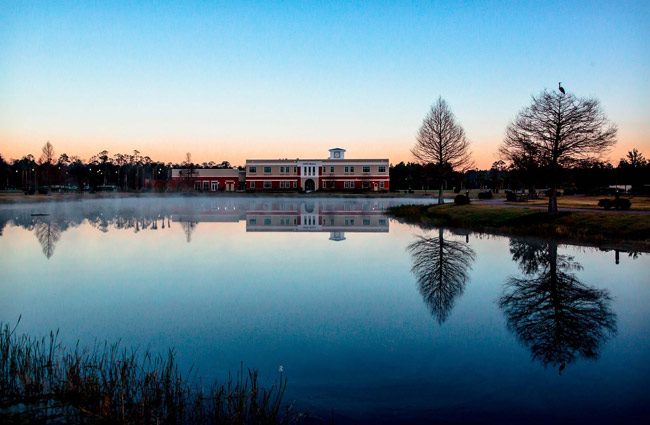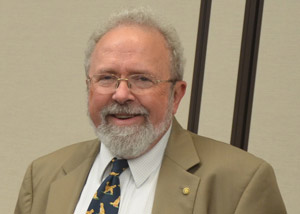
Between the 2014 and 2016 elections, Palm Coast got an entirely new City Council–the first time the council has turned over that quickly and completely. The only equivalent in the city’s history was the founding council of 1999, giving this council a chance to be Palm Coast’s new founders. It’s a rare moment in the city’s 17 years. Whether the council chooses to make its defining mark may not become apparent for a few years, with the benefit of hindsight. But with that in mind, FlaglerLive asked all five council members to imagine the Palm Coast they would like to look back on at the end of their term, and write what they see as a way of setting out their vision–whether as a state of the city address that looks back on their years, or in a more conventional look forward. The results are being published this week over five consecutive evenings. Mayor Milissa Holland’s piece appeared Monday.
![]()
By Robert Cuff
If you grew up when I did, predicting the future was fun and exciting. Post-war faith in science and technology made most of my generation believe that society’s problems were simply another version of the space race and would yield to inevitable scientific advances. For many, that faith was still working its magic when the planners, engineers and scientists began to draw the first outlines of Palm Coast.
Unlike many cities, Palm Coast has always been a planned community. It didn’t start with a river, natural harbor or crossroads that looked like it needed a town to go with it. Instead, Palm Coast started with thousands of acres of flat pine forest, a blank sheet of paper in a conference room far from those pine trees and the faith that proper planning would produce a city where a quarter of a million people would want to live–eventually. Most cities start small and expand while overcoming challenges created by geography and history. Palm Coast started big and its history so far has largely been the story of how we have grown to fill out the oversized suit of clothes created for the city during a time before it housed even a few hundred actual residents.
Because of this, Palm Coast in 2020 will look much as it does today. The changes over only four years will be mostly subtle, but there will be changes and growth since Palm Coast was designed to grow. In many ways, our clothes are still several sizes too big, even as they’ve begun to pinch in other ways.
Fortunately, one of the reasons that Palm Coast in 2020 will be so similar in appearance to Palm Coast in 2016 is the preservation of our natural environment. There will still be more trees than people, along with the natural features we appreciate today–the old tree canopies, our linear parks through those canopies and along waterways, marshes and kayak trails through areas such as Longs Creek. City planners and private developers will still wrestle with how much preservation vs. how much development is needed and appropriate, but the decision – at least for the next four years – will always emphasize preservation.

The most visible change will be new construction: a WaWa here, a restaurant there; a few or a lot more single-family homes, depending on the market demand. But even these familiar and predictable signs of growth will be subtly different. Fewer commercial or residential projects will take place on stand-alone sites or quarter-acre lots, but as part of master planned developments, either clustered together with other commercial uses or in conjunction with some type of residential use. Even though most residents will still live in one of the thousands of single family homes on quarter-acre lots that are as much a symbol of the city as any logo or marketing slogan, increasingly, these homes will be sharing the housing market with smaller homes on smaller lots, multi-family projects and housing designed for different markets: seniors, young families or individuals who don’t need the size or want the upkeep of the homes that have defined Palm Coast housing and driven our economy from the beginning.
Beyond this construction, the changes will be harder to see.
Behind the trees west of U.S. 1, a new wastewater treatment plant connected to new collection lines and pump stations will be handling the increased demand for service that the steadily growing population and businesses require. Underground or far from public view, existing and new city wells will still collect the groundwater that sustains the city. But maintaining an adequate supply of water over the next four years and beyond will require constant refurbishment of existing wells, new wells to tap the deeper aquifer further to Palm Coast’s southern border and the use of increasingly brackish water treated with new methods of filtration to allow it to supplement the city’s water supply. The meters, valves and other devises connecting these pipes will become smarter and allow the city to keep closer watch on the drinking water supply, since this is the one natural resource that will almost certainly restrain future growth long before we run out of land to build things on.
The traffic on our roads, existing and new, will look much the same. Palm Coast was designed with the assumption that residents would own cars to go along with their detached single family homes on relatively large lots. This created quiet residential streets but required a personal vehicle to get to shopping, work, recreation or other services. The design was never intended to work with conventional fixed route mass transit systems since the assumption was that none would be needed, at least beyond the railroad stations some early plans showed along the FEC tracks west of U.S. 1.
To offset this for new developments, new land planning will continue to promote different styles of housing in closer proximity to shopping and services, making walking, bicycling and some forms of mass transit more practical. These developments already exist, although still mostly on paper, for areas like Palm Coast West, Town Center, Neoga Lakes and others. Because of this, we’ll still complain about traffic and there will be more traffic to complain about. But the flow of vehicles will be helped by systems that allow city staff to monitor signals and intersection conditions from central locations and detect failures in the signals before the angry calls start arriving at city hall.
By 2020, fixed route buses may begin linking parts of the city and other areas of Flagler County but this service will almost certainly be limited and high cost. The transit vans now operated by Flagler County will still exist, but new methods of booking a ride and more efficiently sharing multi-passenger vans to reach locations in and beyond the city will almost certainly be possible. Private ride-sharing systems will be more widely available and widely used, but cannot take the place of more efficient “semi-mass transit.”
An attentive observer may even notice that a handful of the vehicles travelling our roadways are missing their drivers. Autonomous vehicles aren’t likely to be numerous by 2020, if they are here at all, but the road system in Palm Coast and the needs of residents will eventually make these vehicles, whether privately owned or operated by an on demand ride-sharing system, the technology that may finally overcome the challenges of living in a city originally designed as much for cars as people.
The most subtle changes will be how we use and share information. Most of the changes already mentioned rely on smart technology to one degree or another. Even in four short years, this use will only accelerate. High speed internet access, both wired and wireless, and ubiquitous and stable wireless phone service will become the norm in every home and business in the city. Beyond the marketing hype of service providers, this infrastructure will become as much a backbone of the city as our streets and utilities and be just as important for economic development as any other governmental service, since businesses will include this capability on their basic site selection checklist and few will consider a new location without these services any more than they would select a site with insufficient water or electricity.
Beyond the changes to “stuff,” whether visible or invisible, the most important changes will be social changes such as closer cooperation between the city, other cities, the county and state government. Few of the changes mentioned earlier, particularly in transportation, technology or economic development, will work as well or even be possible if they are confined to city boundaries.
True progress requires a decrease in the “us vs. them” mentality that has shaped a good part of the early history of the city, but another change should also be evident by 2020. The city will be twenty years old, not a great age by most standards. But the age of the city combined with residents who already lived here before incorporation means an increase in the number of Palm Coast natives. As an increasingly large percentage of our population truly think of Palm Coast as their hometown, residents who were born here and feel invested in the city and its future will be less likely to dismiss city and county needs as “not my problem” and more likely to support private and public initiatives in areas such as the arts, education and other social services, since they will see the benefits from these programs for themselves and their families.
As more residents see Palm Coast as their home, more residents will understand and support the need for long range planning and innovative solutions to the problems we will inevitably encounter as growth continues. Without this cooperation and citizen commitment and support, all of the physical improvements will be nothing more than an “improved means to an unimproved end.” With this commitment by our residents, combined with hard work by city staff and elected leaders, the long range planning that created Palm Coast should make the city of 2020 a community ready and willing to renew itself and continue to be a place that fulfills the expectations of current residents as well as the original planners.
![]()
Robert Cuff, an attorney, spent 17 years with ITT, the last four as its general counsel as the company developed Palm Coast. He was elected to the District 1 seat of the Palm Coast City Council last August. Reach him by email here.





























Leave a Reply